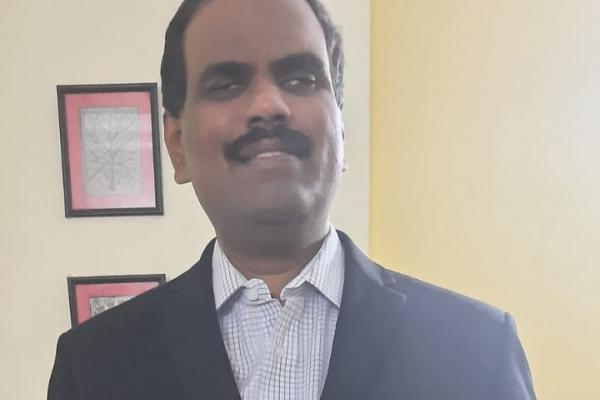
My name is Praveen Kumar Gurunath and I’ve been working with VSO for the past 19 years in various roles. For the past six years I've worked as the Global Lead Advisor for Social Inclusion.
Early on, I was part of the VSO India programme, where I worked as Head of Programmes and as interim Country Director before taking up this role.
I have a lived experience of disability. I was born with visual impairment, and I became blind over time.
I have experienced and observed the struggle and the discrimination that people with disabilities face. With a view to do something for society, I did a master’s degree in social work, I really wanted to do something for people given the opportunities that I had.
Before VSO, I worked with organisations such as ActionAid, where I learned about rights-based approach and advocacy. Being at VSO strengthened my understanding of these issues further, by working alongside volunteers, partner organisations and civil society organisations to promote social inclusion and gender equality in society.
A day in the life
Since the lockdown, my work has been mostly remote. I maintain a regular nine-to-six schedule as if I were going into the office. Although working from home comes with the occasional family distraction, I remind myself that it is office time and remain focused on my daily targets.
My favourite part of the work is going to the village and sitting under a tree to talk to different groups of people, such as women, farmers, or people with disabilities. I find it valuable to understand and empathise with the struggles they face, but also to witness their resilience and ability to solve problems.
I am also interested in exploring how technology can be used to improve people's lives. Assistive technologies, such as the screen reader on my laptop, have enabled me to work independently.
Even if I am not out in the field, I can still interact with team members, deliver training and coaching, and share my knowledge through social inclusion and gender training, as well as the intersectional feminist leadership training we are offering.
Inclusion for everyone means everyone
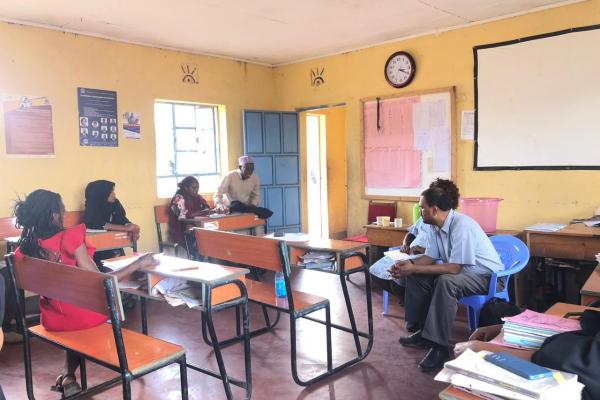
My priority is to ensure that our entire organisation embraces diversity, equality, and social inclusion in our programmes. This means identifying factors of exclusion, discrimination, and marginalisation both within and beyond VSO.
We need to appreciate the privilege, power, and position that we hold, and recognise exclusionary practices in the communities we work with in order to address these issues.
I'm using these terms very broadly because excluded and marginalised people and groups are multifaceted, with exclusionary factors based in class, caste, ethnicity, religion, political dissent, HIV status, sexual orientation, disability, gender, age, geography of origin, and many more.
We need to take all of these into account to deliver our interventions in a way that upholds the rights of every human being.
The changing face of VSO
The nature of our volunteer pool has significantly diversified. Historically, we only had professionals recruited from Europe coming to countries in Africa and Asia.
We always had a white man or woman going out to volunteer – but over time, VSO has shifted that paradigm. We have much more diversity in our volunteers, with the majority being from Africa and Asia. We also recognise that there are people with technical skills around the world.
I think we are one of the first organisations to do that and I’m happy to be a part of that change. We prioritise diversity within our workforce and volunteer posts. Additionally, we have a mission to promote social inclusion, and we provide training to our partners and volunteers on power dynamics, discrimination, unconscious bias, disability, and gender.
These concepts are contextual and require ongoing work at both a personal and project level. It is more of a journey, a journey of individuals.
From the grassroots to government
We need to listen to the voices of people in creating change. When people need change, they themselves are the best agents and advocates for it. They can express what they want to do and how they can achieve it. Although we may also have different solutions, they will not work if they are not created and led by the people.
Building and strengthening movements is crucial in this process. We work closely with other organisations to enhance their capacity as advocates for change. For example, in our resilient livelihoods programmes, we work with women's groups to improve their understanding of rights and learn from them about local solutions.
We must ensure that these groups are diverse and intersectional, including women who are HIV positive, from internally displaced communities, who are young or who have a disability.
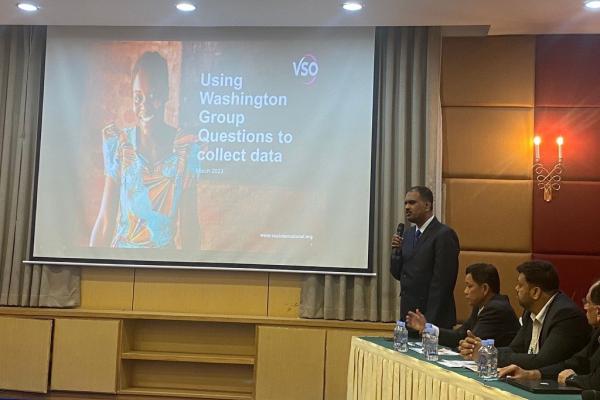
When we talk about advocacy, it is not always about fighting with the government. Collaborating with the government can also help to strengthen our advocacy efforts. For example, VSO works closely with the Ministry of Education in Nepal to develop the Gender Equality Inclusion Network, where young girls can come together to learn about sexual and reproductive rights.
Today, women are more aware of their rights and the prevalence of gender-based violence. However, there are still many challenges in the contexts VSO works in.
Education is limited, health services are not easily accessible, and information is not readily available. Access to healthcare is increasing due to awareness-raising efforts, but securing access for specific groups remains a challenge. We need to consider accessibility for all. For example, how will blind women access family planning services? Can we provide alternative formats such as Braille or audio?
Another example of successful engagement is with men. Engaging men is crucial for gender equality. It is not just about women; it is about both men and women, as well as other non-binary individuals. In Sierra Leone, we established husband clubs to educate men about issues of gender-based violence, women's rights, and the importance of access.
We have seen positive changes in behaviour, attitudes, and family dynamics. The more we engage men in conversations about gender equality, the more change we will see. We cannot simply work with women and label it as "women's issues." We must engage men and boys early on as much as possible.
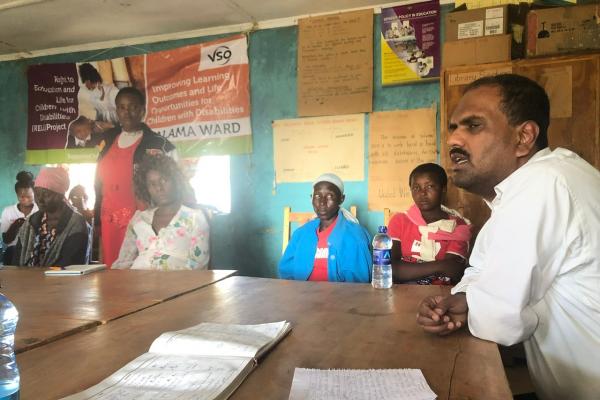
Every day presents new challenges as I work across different countries and contexts. To navigate through these, I focus on identifying changing trends, which is a day-to-day task.
Within VSO, my role involves building the capacity of staff and volunteers, providing support and mentoring, and strengthening confidence to address issues and challenges. My work keeps me motivated, and it is not just a job, but a life journey. My mission is to walk the talk and do what I want to see in the world.
A life’s work
I worship my work and that's my top priority. In my free time, I like listening to lots of different genres of music. I love the diversity of music; I listen to African music, country music, British music like The Beatles, reggae from Jamaica and Indian music. My favourite past time is listening to British sitcoms from the 1950s and 1960s like Hancock’s Half Hour and Steptoe and Son.
I also often listen to audiobooks. On a recent flight from Bangladesh to India, I completed listening to George Orwell’s, Animal Farm, which revolves around power struggles and privileges.
In addition to these hobbies, I am currently writing a book about my life experiences as a blind person. Rather than focusing on the sad parts, I aim to highlight the positive aspects and share how to enjoy life despite obstacles.
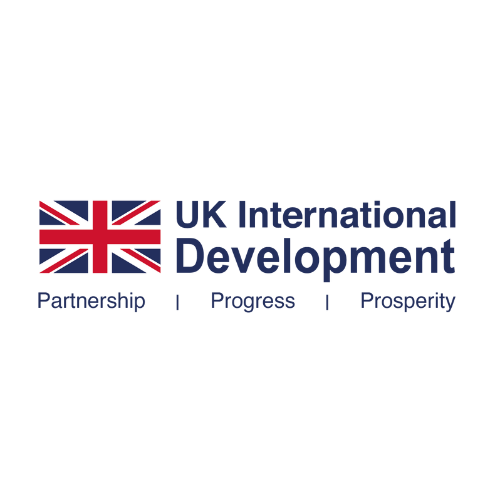
I will work on inclusion wherever I am. VSO has given me an opportunity and platform to promote what I believe in. I am very passionate about diversity and disability in development. My goal is to influence people to recognise exclusion and marginalisation, while also celebrating individual diversity and creating spaces for participation and access to services, opportunities, and rights.
VSO is the right platform, it gives me the opportunity to work with a wide range of teams, staff, volunteers, partners, and government organisations to achieve our mission of creating a fair world for everyone.
Life at VSO
Read our Life at VSO series for more personal accounts of what it's like to work at VSO.
Read more

A ripple of change: how VSO volunteers are transforming communities
Every act of volunteering begins with a choice — a decision to act out of a desire to make a difference. Across the world, VSO volunteers are proving that one spark of action can ignite something much bigger.

The two volunteers empowering girls and young women in Mozambique
Nelma and Carmirene and are two volunteers working on VSO's EAGLE project in Mozambique. For Nelma and Carmirene, education is not just about school, it is about meeting people where they are and using the right tools to challenging harmful norms. Here are their stories.
Opening doors to safety, education, and a brighter future
For girls in Karamoja, the poorest region in Uganda, being forced into early motherhood is all too common. This Christmas, you can open the doors to Safety, Education, and a Brighter Future.
